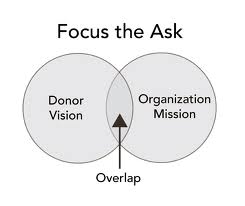 Last week we started a series of blog posts focused on the art of asking questions, and this theme has carried over into this week. So far, we’ve looked at questions that executive directors should be asking themselves and their boards. We’ve also looked at questions board members should be ask of themselves and their fellow board volunteers. Yesterday, we looked at various questions you need to ask prospective board members before asking them to join your board. Today, we’re ending this series of posts by looking at 1) powerful questions that donors should be asking the non-profit agencies they support and 2) questions non-profits should be asking their supporters.
Last week we started a series of blog posts focused on the art of asking questions, and this theme has carried over into this week. So far, we’ve looked at questions that executive directors should be asking themselves and their boards. We’ve also looked at questions board members should be ask of themselves and their fellow board volunteers. Yesterday, we looked at various questions you need to ask prospective board members before asking them to join your board. Today, we’re ending this series of posts by looking at 1) powerful questions that donors should be asking the non-profit agencies they support and 2) questions non-profits should be asking their supporters.
Questions that donors have of you
Over the last 15 years, I have been part of countless solicitation teams and answered more questions than I care to recall at this time of the morning. While those questions tend to be all over the place thanks in part to “unique circumstances,” there are commonly asked questions that many donors seem to ask after they’ve been asked to consider making a charitable contribution.
 What will my contribution help accomplish?
What will my contribution help accomplish?- Specifically, how will my contribution make a difference in your clients’ lives?
- How financial stable is your organization?
- There are so many worthy causes that keep asking for support. Why should I support you?
- How much of my contribution directly supports programming and how much will underwrite administrative and fundraising expenses?
- Tell me more about your fee structure and why are you charging your clients what you’re charging them? How do you know that is the right amount? Why not more?
The list of FAQs is much larger, but these are just questions that I recall answering over and over again. If you want a more comprehensive list of questions, you may want to read Harvey McKinnon’s book “The 11 Questions Every Donor Asks: And the Answers All Donors Crave“.
Why is it important to know what burning questions to expect? I think there are two HUGE reasons:
- If you do a better job “anticipating” these questions and build those answers into your case for support and solicitation presentation, I predict that your annual campaign numbers will start climbing.
- There is a long list of fears that get in the way of people volunteering to help your agency with fundraising. One of the top reasons is their fear of not being able to answer questions. Addressing FAQs as part of your annual campaign training program will improve volunteer confidence, reduce the amount of avoidance behavior during the campaign, and result in better solicitations (and hopeful result in better fundraising numbers).
Questions that you should have of donors
 As I said earlier, I’ve been on many fundraising solicitation teams, and I’ve seen many things throughout the years. Too often, I’ve seen volunteers rush through the solicitation, get a commitment, and quickly downshift into chit-chat of a personal nature. It is almost as if the volunteer solicitor is non-verbally saying “Phew! Thank goodness that is over.”
As I said earlier, I’ve been on many fundraising solicitation teams, and I’ve seen many things throughout the years. Too often, I’ve seen volunteers rush through the solicitation, get a commitment, and quickly downshift into chit-chat of a personal nature. It is almost as if the volunteer solicitor is non-verbally saying “Phew! Thank goodness that is over.”
I don’t believe there is anything wrong with chit-chat after the solicitation is completed. In fact, there is all sorts of important personal information that could and should be harvested from that conversation, captured on a contact report form, and entered into the donor database. However, most volunteer solicitors don’t receive training on what those conversations should look like.
While it would be easy to use that post-solicitation time to talk about family and personal things, it think the following questions might be more useful in developing a deeper philanthropic relationship with your donors:
- If you only had one year to live, what would be most important to you to accomplish?
- What are the issues, injustices, principles or causes in this world that get you riled up?
- If you could change one thing in the world, what would it be?
- What accomplishment or legacy would have ultimate significance to you?
- In philanthropic terms, if you had unlimited resources, what would you set out to do?
While it is important to know the names of a donor’s spouse and children as well as where they went to school or go to church, I think it is far more important to understand a donor’s passions, dreams, and desires. Knowing and understanding these things puts you in a position of helping them achieve big things. I believe this is one of the biggest differences between transactional fundraising and donor-centered fundraising™.
I believe these types of questions can transform how a donor views you and your organization . . . FROM fundraising vulture TO philanthropic dream-maker.
Please take a minute this morning to share a commonly asked question that you hear donors asking your volunteer solicitors in the comment box below. Or share with this online community one or two questions that you like to ask donors that helps you better understand their philanthropic hopes and dreams. We can all learn from each other and it is just 60 seconds out of your day. Please?
Here’s to your health!
Erik Anderson
Founder & President, The Healthy Non-Profit LLC
www.thehealthynonprofit.com
erik@thehealthynonprofit.com
http://twitter.com/#!/eanderson847
http://www.facebook.com/eanderson847
http://www.linkedin.com/in/erikanderson847

17 comments